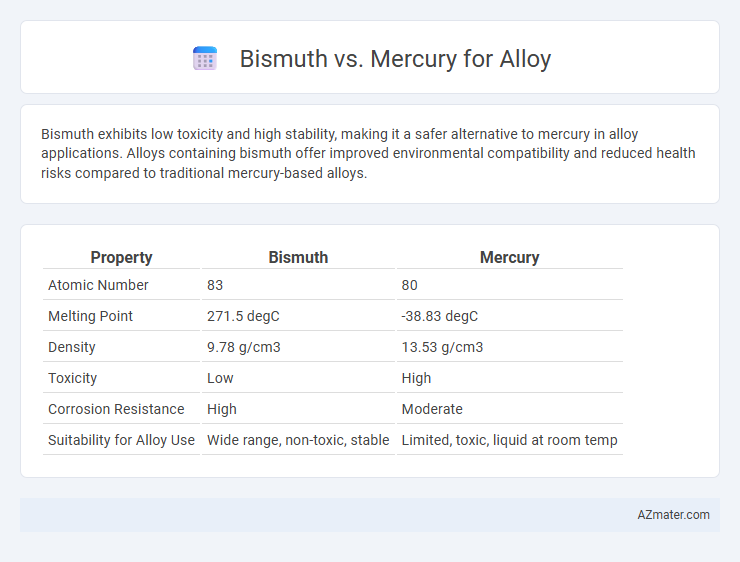Bismuth exhibits low toxicity and high stability, making it a safer alternative to mercury in alloy applications. Alloys containing bismuth offer improved environmental compatibility and reduced health risks compared to traditional mercury-based alloys.
Table of Comparison
| Property | Bismuth | Mercury |
|---|---|---|
| Atomic Number | 83 | 80 |
| Melting Point | 271.5 degC | -38.83 degC |
| Density | 9.78 g/cm3 | 13.53 g/cm3 |
| Toxicity | Low | High |
| Corrosion Resistance | High | Moderate |
| Suitability for Alloy Use | Wide range, non-toxic, stable | Limited, toxic, liquid at room temp |
Introduction to Bismuth and Mercury in Alloys
Bismuth and mercury are key metals used in various alloys due to their unique properties. Bismuth offers low toxicity, high density, and a low melting point, making it ideal for lead-free solders and fusible alloys with enhanced safety and environmental benefits. Mercury, a liquid metal at room temperature, is valued for its ability to form amalgams with gold and silver, though its toxicity limits its use in modern alloys.
Physical Properties Comparison: Bismuth vs Mercury
Bismuth exhibits a high melting point of 271.5degC and a density of 9.78 g/cm3, making it solid at room temperature, whereas mercury remains liquid at room temperature with a melting point of -38.83degC and a density of 13.53 g/cm3. Bismuth has a lower vapor pressure and is less toxic compared to mercury, crucial factors for alloy stability and safety. The significantly different thermal conductivities and expansion coefficients between bismuth and mercury influence their alloy behavior and applications in fusible alloys and low-melting-point materials.
Toxicity and Environmental Impact
Bismuth alloys are significantly less toxic than mercury alloys, making them safer for both human health and the environment. Mercury is a well-known neurotoxin that can cause severe environmental pollution, bioaccumulation, and long-term ecosystem damage, whereas bismuth is considered non-toxic and eco-friendly. The substitution of mercury with bismuth in alloys reduces hazardous waste, minimizes occupational exposure risks, and supports sustainable manufacturing practices.
Melting Points and Alloy Formation
Bismuth has a melting point of 271.5degC, significantly higher than mercury's melting point of -38.83degC, influencing their alloy applications. Bismuth forms low-melting, non-toxic alloys often used in fire detection and medical devices, while mercury's liquid state at room temperature allows easy amalgamation with metals but poses toxicity concerns. The distinct melting points affect alloy stability, with bismuth-based alloys preferred for solid-state applications and mercury alloys mainly utilized where fluidity at low temperatures is required.
Industrial Applications of Bismuth Alloys
Bismuth alloys offer superior environmental benefits compared to mercury alloys, making them ideal for industrial applications requiring non-toxic, lead-free alternatives. These alloys exhibit low melting points, excellent machinability, and thermal expansion properties suitable for precision casting, electrical fuses, and fire safety devices. The industrial preference for bismuth in alloys stems from its non-toxicity and recyclability, enhancing sustainability in manufacturing processes.
Uses of Mercury Alloys in Industry
Mercury alloys, also known as amalgams, are widely used in dental applications, thermometers, and electrical switches due to mercury's unique liquid state at room temperature and excellent electrical conductivity. These alloys provide reliable performance in precision instruments and electrochemical cells, benefiting industries like healthcare, electronics, and mining. Despite increasing environmental concerns, mercury alloys remain critical in specific industrial processes requiring precise thermal and electrical properties.
Advantages of Bismuth Over Mercury in Alloys
Bismuth offers significant advantages over mercury in alloys due to its non-toxic and environmentally friendly nature, making it safer for use in various industrial and medical applications. Its higher melting point and stable crystalline structure enhance the durability and performance of alloys, providing better mechanical properties and corrosion resistance. Bismuth's low thermal conductivity combined with its ability to expand upon solidification ensures more precise casting and reduced defect rates in alloy production.
Safety Considerations in Alloy Production
Bismuth offers a safer alternative to mercury in alloy production due to its non-toxic and environmentally friendly properties, reducing health risks for workers. Unlike mercury, which is highly toxic and poses significant hazards through vapor inhalation and skin contact, bismuth alloys minimize exposure to hazardous substances. The use of bismuth enhances workplace safety and complies with stricter environmental regulations, making it the preferred choice for safer alloy manufacturing processes.
Cost and Availability of Bismuth and Mercury
Bismuth is generally more abundant and less toxic than mercury, making it a safer and more cost-effective option for alloy production. Mercury, despite its unique liquid properties at room temperature, is rarer and subject to stricter regulations due to its toxicity, which significantly increases its cost and limits availability. Consequently, bismuth alloys are preferred in many industrial applications where cost efficiency and environmental safety are critical factors.
Future Trends in Alloy Development
Bismuth is gaining prominence over mercury in alloy development due to its non-toxic and environmentally friendly properties, aligning with stricter global regulations on hazardous materials. Future trends emphasize bismuth-based alloys for applications in electronics, medical devices, and low-melting-point soldering, leveraging its superior thermal stability and recyclability. Research is intensifying on enhancing the mechanical strength and conductivity of bismuth alloys to expand their industrial viability and replace traditional mercury-containing materials.

Infographic: Bismuth vs Mercury for Alloy
 azmater.com
azmater.com